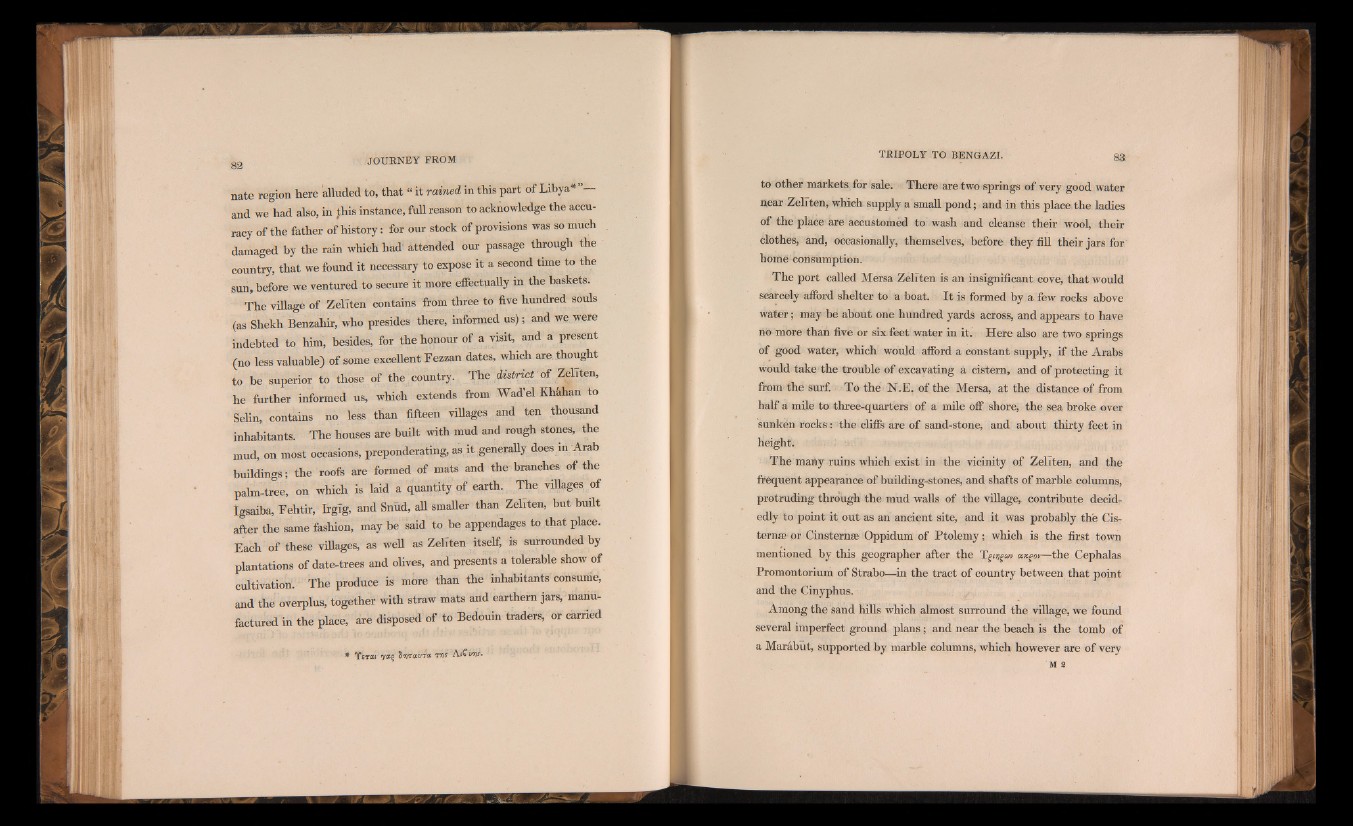
82
nate region here alluded to, that “ it rained in this part of Libya*”—
and we had also, in this instance, full reason to acknowledge the accuracy
of the father of history: for our stock of provisions was so much
damaged by the rain which had1 attended our passage through the
country, that we found it necessary to expose it a second time to the
sun, before we ventured to secure it more effectually m the baskets.
The village of Zellten contains from three to five hundred souls
(as Shekh Benzahir, who presides there, informed us); and we were
indebted to him, besides, for the honour of a visit, and a present
(no less valuable) of some excellent Fezzan dates, which are thought
to be superior to those of the country. The district ot Zeliten,
he further informed us, which extends from Wad’el KMhan to
Selin, contains no less than fifteen villages and ten thousand
inhabitants. The houses are built with mud and rough stones, the
mud, on most occasions, preponderating, as it generally does in Arab
buildings; the roofs are formed of mats and the branches of the
palm-tree, on which is laid a quantity of earth. The villages of
Igsaiba, Fehtir, IrgTg, and Snud, all smaller than Zeliten, but built
after the same fashion, may be said to be appendages to that place.
Each of these villages, as well as Zeliten itself, is surrounded by
plantations of date-trees and olives, and presents a tolerable show of
cultivation. The produce is more than the inhabitants consume,
and the overplus, together with straw mats and earthem jars, manufactured
in the place, are disposed of to Bedouin traders, or carried
* Ye riw i v ira tv ro c m s Aȣ iw .
to other markets for sale; There are two springs of very good water
near Zeliten, which supply a small pond; and in this place the ladies
of the place are accustomèd to wash and cleanse their wool, their
clothes, and, occasionally, themselves, before they fill their jars for
home consumption.
The port called Mersa Zeliten is an insignificant cove, that would
scarcely afford shelter to a boat. I t is formed by a few rocks above
water ; may be about one hundred yards across, and appears to have
no more than five or six feet water in it. Here also are two springs
of good water, which would afford a constant supply, if the Arabs
would take the trouble of excavating a cistern, and of protecting it
from the Surf. To the N.E. of the Mersa, at the distance of from
half a mile to three-quarters of a mile off shore, the sea broke over
sunken rocks : the cliffs are of sand-stone, and about thirty feet in
height.
The many ruins which exist in the vicinity of Zellten, and the
frequent appearance of building-stones, and shafts of marble columns,
protruding through the mud walls of the village, contribute decidedly
to point it out as an ancient site, and it was probably the Cis-
ternæ or Cinsternæ Oppidum of Ptolemy ; which is the first town
mentioned by this geographer after the Tçuiçm uzgov—the Cephalas
Promontorium of Strabo—in the tract of country between that point
and the Ginyphus.
Among the sand hills which almost surround the village, we found
several imperfect ground plans ; and near the beach is the tomb of
a Marâbut, supported by marble columns, which however are of very
M 8